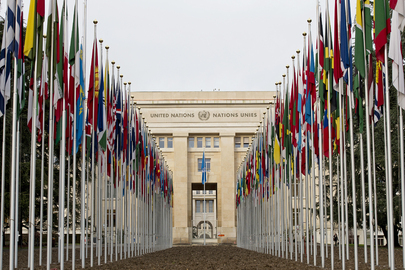Moving around Gaza has become ever more difficult amid the ongoing 21-month-long war.
Mr. Saad, who was displaced from the town of Beit Lahia in the northern Gaza Strip, was waiting for the vehicle pulling the cart he was sitting in to move.
“Transportation is very difficult and unsafe,” he told UN News. “The roads are exhausting. We pray to God to grant us patience and to return home.”
This was on Rashid Street, west of the city, which connects the north and south of the Strip. It is crowded with carts, cars and three-wheeled motorcycles that have also been converted into means of transportation.
The area is interspersed with tents of displaced people, all surrounded by the rubble of buildings destroyed by war on both sides of the road.
War and evacuation orders have left many in Gaza scrambling for transportation to safety.
A luxury not for everyone
“People can barely find enough to eat, so how will they pay for transportation?” Umm Haytham Al-Kulak asked while waiting in a passenger compartment attached behind a motorcycle,
“We walk mostly; we can’t take public transportation,” she said.
“May God help the drivers. Fuel prices are high, and all the people are exhausted and overwhelmed.”
In Gaza, many people have no choice but to use risky ways to get around during the ongoing war.
Sky high fuel costs
Drivers are paying skyrocketing prices for fuel, which is a heavy burden, Abdel Karim Abu Asi said as he waited for his car to be fully loaded with passengers.
“The price of a litre of diesel has reached 100 shekels [around $27],” he said. “What should we do? We’re trying to use locally produced fuel, but it causes significant damage to cars and a lot of problems.”
This isn’t the only problem facing drivers. Mr. Abu Asi said the prices of spare parts are very high. A part that used to cost around 100 shekels now sells for around 2,000 shekels, or around $560.
“We also suffer from the destruction of the streets, and no matter how hard the municipalities try to repair them, the problem is not solved because they require a large number of bulldozers to clear them,” he said.
“People must be helped with transportation costs and many other aspects.”
Fuel vendors sell their products at sharply inflated prices, with a litre of fuel reaching around 100 shekels.
Only option
Despite all the challenges, people there continue to go about their daily lives, even if it takes all day to get from one place to another. That’s what happened to Hussein Al-Hamarneh, who was waiting in a car to travel to the southern Gaza Strip.
Mr. Al-Hamarneh believes that most of these means of transportation are “uncomfortable, such as tuk-tuks [three-wheeled motorcycles] and carts pulled by cars, which are primarily designed to transport goods or animals, not people”.
“This is the only option for those who do not own cars,” he said.
Tayseer Abu Asr, who arranges for passengers to board a cart pulled by a car, stood on the section of the road.
“We’re trying to help people get around,” he said. “These carts have become our only means of transportation after the destruction of buses and taxis.”
On top of these challenges during the ongoing war, the Gaza Strip is facing a fuel crisis.
UN agencies warned earlier this week that the fuel shortage in Gaza has reached critical levels. They said if supplies run out, it will place an unbearable new burden on the population.
Source of original article: United Nations (news.un.org). Photo credit: UN. The content of this article does not necessarily reflect the views or opinion of Global Diaspora News (www.globaldiasporanews.com).
To submit your press release: (https://www.globaldiasporanews.com/pr).
To advertise on Global Diaspora News: (www.globaldiasporanews.com/ads).
Sign up to Global Diaspora News newsletter (https://www.globaldiasporanews.com/newsletter/) to start receiving updates and opportunities directly in your email inbox for free.































